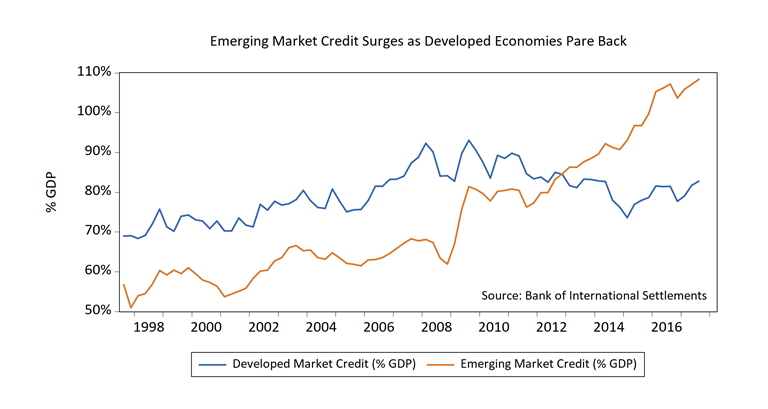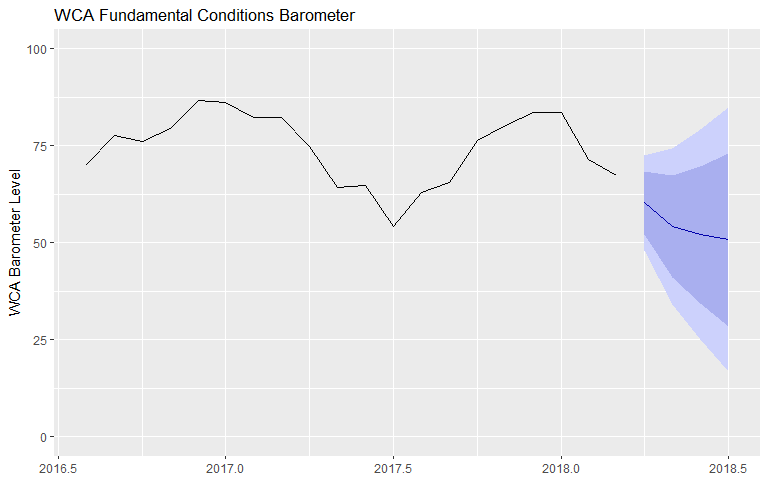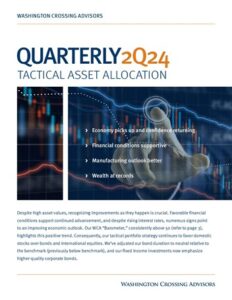Monday Morning Minute 052118
WASHINGTON CROSSING ADVISORS
THE WEEK AHEAD
WCA Barometer holds steady for second month as markets weigh growth, inflation, and rates.
MACROECONOMIC INSIGHT
Strong global demand has driven growth and may now be pushing up against supply constraints. Bottlenecks are leading to higher prices and raising concerns about inflation. Cash and bond markets have been pricing in expectations for firmer inflation and higher policy rates.
Consider global commodity prices. Oil, aluminum, wood pulp, and lumber prices all began to spike a little over a year-ago. Oil is up 20%, aluminum is up 15%, pulp is up 25%, and lumber is up 15-20% from a year ago. Analysts serve up a host of reasons for the increases. Tariffs, sanctions, geopolitics, and natural disasters like forest fires are often cited as the “root cause” of the higher price. Other supply side issues, such as capacity constrained trucking and railway operations, add to the story.
On the demand side, we see other reasons for rising prices. Not only has global demand been on the rebound since early 2016, but we see steady growth in domestic jobs and emerging market credit.
United States’ output reached $17.4 trillion recently, and for the first time, real output exceeds the Congressional Budget Office’s (CBO) $17.3 trillion estimate of “potential” output. At the same time, the U.S. Bureau of Labor Statistics reports the unemployment rate fell to 3.9%, which is below the CBO’s estimate of “full employment.” This indicates that, for now, demand may begin to pushing up against supply, which could explain firming U.S. inflation.
Many of the commodity prices discussed above are priced in global markets, where global conditions hold sway. While real growth in global output seems solid, we are also aware that private credit to emerging market economies (ie. China) remains in overdrive. As the chart below shows, private credit in emerging market has grown rapidly to a very high level compared to output. There is no telling when this might end, but past episodes in rapid credit growth often ended suddenly, without warning, and led to a period of retrenchment.
Given strong global demand and a pickup in global credit growth, coming at a time of tighter capacity, we are not surprised to see some uptick in inflation. For now, the WCA Fundamental Conditions Barometer (Chart, Below) remains relatively steady as markets assess the various interactions between growth, inflation, and interest rates. Source: WCA
With another month of stability evident in the WCA Fundamental Conditions Barometer, we are making no tactical shift between stocks and bonds at this time. Tactically-managed portfolios remain overweight stocks relative to bonds given our near-term forecast.
ECONOMIC DATA THIS WEEK
| Date | Report | Period | Survey | Prior |
| Mon, May 21: | Chicago Fed Activity Index | Apr | — | 0.10 |
| Tues, May 22: | Richmond Fed Manf Index | May | — | -3 |
| Wed, May 23: | FOMC Minutes | |||
| Markit Manufacturing PMI | May | 56.1 | 56.5 | |
| New Home Sales M/M | Apr | -2.0% | 4.0% | |
| Thurs, May 24: | Weekly Jobless Claims | May 19 | — | 222K |
| Existing Home Sales M/M | Apr | -0.5% | 1.1% | |
| Fri, May 25: | Durable Goods Orders | Apr | -1.4% | 2.6% |
| Durables Ex Transportation | Apr | 0.5% | 0.1% | |
| Capital Goods Orders | Apr | 0.5% | -0.4% | |
| Capital Goods Shipments | Apr | — | -0.8% | |
| Consumer Sentiment | May | 99.0 | 98.8 | |
| Source: Bloomberg | ||||
ASSET ALLOCATION PORTFOLIO POSTURE
Based on shorter-term expectations, the “tactical satellite” allocation within portfolios is:
Overweight Stocks vs. Bonds
WCA PORTFOLIO CHANGES LAST WEEK
No change
No change
CONQUEST Asset Allocation Portfolios
No change
DYNAMIC STRATEGIES Asset Allocation Portfolios
No change
No change
Kevin Caron, CFA, Senior Portfolio Manager
Chad Morganlander, Senior Portfolio Manager
Matthew Battipaglia, Portfolio Manager
Suzanne Ashley, Analyst
(973) 549-4168
www.washingtoncrossingadvisors.com
_______________________________________________________________________________________________________________________________________
Disclosures
WCA Fundamental Conditions Barometer Description: We regularly assess changes in fundamental conditions to help guide near-term asset allocation decisions. The analysis incorporates approximately 30 forward-looking indicators in categories ranging from Credit and Capital Markets to U.S. Economic Conditions and Foreign Conditions. From each category of data, we create three diffusion-style sub-indices that measure the trends in the underlying data. Sustained improvement that is spread across a wide variety of observations will produce index readings above 50 (potentially favoring stocks); while readings below 50 would indicate potential deterioration (potentially favoring bonds). The WCA Fundamental Conditions Index combines the three underlying categories into a single summary measure. This measure can be thought of as a “barometer” for changes in fundamental conditions.
The information contained herein has been prepared from sources believed to be reliable but is not guaranteed by us and is not a complete summary or statement of all available data, nor is it considered an offer to buy or sell any securities referred to herein. Opinions expressed are subject to change without notice and do not take into account the particular investment objectives, financial situation, or needs of individual investors. There is no guarantee that the figures or opinions forecasted in this report will be realized or achieved. Employees of Stifel, Nicolaus & Company, Incorporated or its affiliates may, at times, release written or oral commentary, technical analysis, or trading strategies that differ from the opinions expressed within. Past performance is no guarantee of future results. Indices are unmanaged, and you cannot invest directly in an index.
Asset allocation and diversification do not ensure a profit and may not protect against loss. There are special considerations associated with international investing, including the risk of currency fluctuations and political and economic events. Investing in emerging markets may involve greater risk and volatility than investing in more developed countries. Due to their narrow focus, sector-based investments typically exhibit greater volatility. Small company stocks are typically more volatile and carry additional risks, since smaller companies generally are not as well established as larger companies. Property values can fall due to environmental, economic, or other reasons, and changes in interest rates can negatively impact the performance of real estate companies. When investing in bonds, it is important to note that as interest rates rise, bond prices will fall. High-yield bonds have greater credit risk than higher-quality bonds. The risk of loss in trading commodities and futures can be substantial. You should therefore carefully consider whether such trading is suitable for you in light of your financial condition. The high degree of leverage that is often obtainable in commodity trading can work against you as well as for you. The use of leverage can lead to large losses as well as gains.
All investments involve risk, including loss of principal, and there is no guarantee that investment objectives will be met. It is important to review your investment objectives, risk tolerance and liquidity needs before choosing an investment style or manager. Equity investments are subject generally to market, market sector, market liquidity, issuer, and investment style risks, among other factors to varying degrees. Fixed Income investments are subject to market, market liquidity, issuer, investment style, interest rate, credit quality, and call risks, among other factors to varying degrees.
This commentary often expresses opinions about the direction of market, investment sector and other trends. The opinions should not be considered predictions of future results. The information contained in this report is based on sources believed to be reliable, but is not guaranteed and not necessarily complete.
The securities discussed in this material were selected due to recent changes in the strategies. This selection criterion is not based on any measurement of performance of the underlying security.
Washington Crossing Advisors LLC is a wholly owned subsidiary and affiliated SEC Registered Investment Adviser of Stifel Financial Corp (NYSE: SF).





